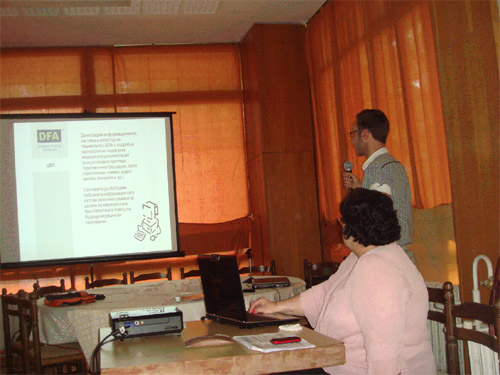The Story of I.D.
The Story of I. D.
We won’t be able to tell the names or show pictures to illustrate this story due to reasons that will very soon become clear but I believe that this story could help more people to understand what it means to have a cleft palate, which is corrected at a late stage of a child’s life and what is more to be abandoned by your parents because of the cleft.
In a sunny morning and not that bright daily round, I was waiting the arrival of my speech therapy patient – a child, now 17 years old, who was raised and lived in an orphanage. He was born with a cleft palate but was first brought to have a palate correction at the age of 11. The surgery is done, but due to the late age of correction, a pharyngoplasty has also been done – a surgery which creates a connection between the palate and the throat. In this way we hoped that anything that a plastic surgery can correct would have been done so that with the help of a speech therapist, the speech would develop best. Due to the change of different orphanages, in which our patient was raised, we meet him again 6 years after the surgery. It was decided that his speech is inadequate and the child was approved for a free speech therapy 6 months programme with me as his therapist, we would assess his stage of progress and decide whether another surgery is needed or only speech therapy will be enough. Although legally the child is figured as mentally deficient, it turned out that he is eager to start speech therapy in order to prove his speech skills. Our appointments were consistent, enjoyable, full of persistence from both sides – his and mine. We talked about his way of life in the institution he was currently living in, talked about his school, friends and his free time. His willingness to improve his speech skills became apparent every time when we were in therapy session. I was glad to see that he was coming to our sessions with a smile and a will to improve. The tasks and exercises I used to give him as homework, he completed with zest, in spite of the tense and unfriendly environment in which he was obviously living.
To my great surprise, during our last meeting, which was our 7th or 8th session, I got seriously worried by the fact that this child, who had an amazing smile, at a certain point collapsed and hid in the deepest corners of the underworld kingdom of darkness. In his efforts to pronounce each and every sound correctly, to articulate words and sentences explicitly, his thoughts and actions were turned upside down. Considering his difficulties, he requested to get a palate correction at the earliest convenience. He wanted to get operated as soon as possible because he was convinced that it was the main reason for his abandonment, the reason that had been torturing him for so many years, the reason why the children his age speak ill of him and the reason for which he was ridiculed and mocked at. I tried to appease him, to find words of solace and refute his arguments, however, at this moment he started crying. He told me that because of the cleft his own mother and grandmother had left him in an orphanage. The people, closest to him, rejected and insulted him, and he had been standing the crude attitude and bitter violence from “his own family”. During his years in the orphanage, despite the detraction he had been put on, he used to visit his “sweet home” and assist his relatives. The scene became even viler when he shared that in the orphanage where he lives now, he is suffering cruel attacks and spiteful mockery. What is worse is that he has been turned into a joke not only by the children in the orphanage but also by the supervisors that work there.
From my personal experience I know that life in an orphanage is quite strenuous, stressful, often rejecting and depressing for all of the people involved in it, from the children to the educators and supervisors. I could only imagine how much pain this boy felt, how many nights he had been scared to fall asleep because in the following day he would become the laughing stock of the orphanage once again. So today, I. D. repeated again and again that he wants to have the surgery because this is the reason why everything went beyond all bounds and why everybody abandons and rejects him. I tried to explain to him that sometimes life puts us to hardships which we must endure and prove that we are stronger among the strongest, smarter than the smartest, and by overcoming the difficulties we come stronger and motivated to succeed, because now nothing can bring us down. I tried to sooth him, to put his thoughts in a positive direction, but he was convinced that he is not capable of learning how to talk correctly. He declined each of my attempts to make him think positively and to realize that it is not important what people say about his appearance, his way of speaking or the place where he lives. He shared with me the insulting words “his friends” used to call him, how they had been telling him that he was ugly with curved mouth and how he was not able to talk. Through many words and persuasion, and even through silence, I was hoping to reach to him and encourage him. In that very moment he had given himself up to despair and his spirits failed, and nothing seemed to be able to take him out of this desperation. He would not stop crying and saying over and over again that he must get the surgery and after it everything would be OK and he would be able to talk normally.
I suggested he should meet with our psychologist and with our surgeon, and he agreed. I asked him if he wanted to go back and live with his parents and help them, but he was definitely convinced that he did not want to live with people who insult him and mock at him. He preferred living in an orphanage and help those people, but definitely not help his mother. I told him that I insist that when he comes and then goes from my consulting room he should smile and be aware that whenever he needed to talk to someone, I was going to be there.
The appointment with the surgeon had a positive effect, since he promised him that he would not be left without treatment no matter what kind it is going to be. Initially, it was agreed that certain consistent efforts must be made and we should meet for more than just a few sessions.
One thing is sure – a speech therapy, started at a later age, can be the hardest part of the treatment. At this point, however, all of us, both the patient and we – his healers, are going to do our best to refute the argument that when the surgery has been made at a late stage of development, an excellent result cannot be obtained.
Most people easily feel sympathy for someone who has external disability, but when it comes to speech, things get blurred and it is mistakenly taken for mental disability or other capacities. Very often, the institutions, that give benefits and define the stage of disability, assess as disabling only those defects that require surgery. We have frequently witnessed cases where the child has obviously badly repaired lip, and since there are no clefts on the palate, and by the rules of our Institution for Assessing the Disabilities, the child is assessed as cured, in spite of the fact that it speaks completely incomprehensibly. It is evident that there is much work to be done both by ALA and our society so that every child born with a facial anomaly would have the chance to get the treatment they deserve, and that would allow them to develop all of their capacities.
Even if it is late, it can never be too late. Therefore, we will do our best to make everything possible our I.D. to speak like everyone else!
Maria Kazakova – speech therapist at ALA




